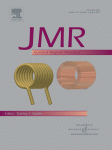
Professor Chad Rienstra and his research group, working in collaboration with scientists from Varian, Inc., have developed a new and revolutionary design for nuclear magnetic resonance (NMR) probes used to determine the molecular structures of proteins and other biomolecules in the solid state. Many protein samples are best isolated in the presence of salts, but the presence of these salts leads to undesirable heating due to high power 1H decoupling, which limits the experimental lifetime of protein samples for solid-state NMR (SSNMR). Unlike the resonator used in all current NMR probes, which is a solenoid coil, Professor Rienstra and his collaborators have devised a novel scroll coil resonator structure. The scroll coil is more tolerant of high sample salt concentrations and causes less sample heating, with approximately equivalent sensitivity. The breakthrough will considerably facilitate the determination of protein structures by SSNMR, a technique in which Professor Rienstra is a world leader. The work was published as the cover article in the March 2005 issue of the Journal of Magnetic Resonance.